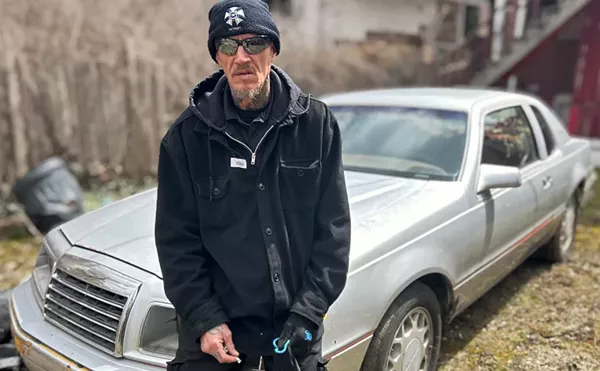

Audio By Carbonatix
[
{
"name": "GPT - Leaderboard - Inline - Content",
"component": "35519556",
"insertPoint": "5th",
"startingPoint": "3",
"requiredCountToDisplay": "3",
"maxInsertions": 100,
"adList": [
{
"adPreset": "LeaderboardInline"
}
]
}
]
Detroit Mayor Mike Duggan will almost certainly win re-election in a couple weeks, and I think he deserves it.
But he also deserves to be challenged more about his vision for the next four years. Sadly, State Senator Coleman Young II has failed to articulate any kind of alternative vision or coherent plan. If you are reading this on Wednesday, Oct. 25, the challenger gets a final shot at making his case tonight, when the men take part in their one and only mayoral debate at 8 p.m., an encounter televised on WDIV and WTVS.
Young will get some votes from people in the many neighborhoods who so far have not shared a bit in any of the much-celebrated renaissance that has elevated a 7.2-square-mile stretch of downtown and Midtown.
There are also a few who just can't bring themselves to mark their ballot for a mayor who happens to be white.
Yet, looking at the primary results, it's hard to imagine Duggan getting less than two-thirds of the vote.
But what then?
John Mogk, now 78, is one of the wisest men in the city — one who isn't appreciated enough — and an expert on urban problems and the law. Next year, he'll have been a professor at Wayne State University law school for half a century, where he's always been deeply engaged with the city and its problems.
Before that, he was a young legal adviser to the program Bobby Kennedy started revitalizing in the Bedford-Stuyvesant section of Brooklyn. But he wanted to come back here after the city tore itself apart in 1967 to do something to help.
Few remember now, but he inspired many with his maverick mayoral campaign in 1973, in which he walked as many of the city neighborhoods as he could. Since then, he's served on every board and commission you can imagine, and a few more you can't, including as an adviser to a previous attempt at a master plan.
I asked him what he thought about where Detroit is now.
"In my view, Mike Duggan has done an exceptional administrative job, considering the distressed and dysfunctional conditions the city was in when he took office," he says. "For the most part, he has appointed the best people available to his administration and has held them accountable."
He went on to praise Duggan for coming up with creative approaches to various problems, and vastly improving city services. But Mogk thinks he needs to raise his sights.
"During his second term, Mike needs to move from fixing the short-term problems to laying a long-term foundation for the city," Mogk says — including a realistic master plan.
Duggan's slogan, ever since he first took office, has been "every neighborhood has a future." Mogk thinks that may be counterproductive — "Good for politics, bad for long-range city development, cost-efficient services and local businesses," he says.
Simply put, a city that once had close to 2 million people now has 672,000, and while the population drain may have stopped, no rapid increase is expected soon.
What Mogk thinks the mayor needs to do is work on incentives to "consolidate population and design productive uses for vacated neighborhoods." He'd like to see an intelligent reworking of the Detroit Future City Framework into a revised master plan for the city.
But Detroit desperately needs something else, too: eminent domain — the power to take, when absolutely necessary, private property for economic development.
That's what the city did back in the 1980s to build the Poletown plant, bulldozing an entire neighborhood in the process. That decision was heavily criticized.
Then, in July 2004, the Michigan Supreme Court in County of Wayne v. Hathcock ruled that taking land for private development was illegal, and should not have been allowed.
Today, that ruling has made it extremely hard for Detroit to attract new business. "We've got tons of land, but it's in checkerboards of small parcels," Duggan told me in August.
That has made it impossible for the city to compete for major new plants, all of whom want sites of several hundred acres. Detroit has 24 square miles, but few large parcels.
Mogk thinks the city needs to be able to use eminent domain for economic development. He thinks Duggan should be pressing for a constitutional amendment that would allow that. He's aware there are dangers of abuses, and would allow any homeowner who had lived in their home at least one year to be able to refuse to sell to the city, if they so chose.
Without this, he said, any time speculators get wind that the city wants to attract a project, they are bound to buy up land and hold the taxpayers up for exorbitant prices.
That's what they did, Mogk notes, when the Ilitch organization was assembling land for Little Caesars Arena.
The professor has other advice for the mayor too, including strengthening community organizations.
What's most vital, however, is that a reelected Mike Duggan starts turning his attention to the long term. Otherwise, in a few years, the boulder might just roll right back down.
Screw transparency
What did the governor know, and when did he know it? "One Tough Nerd" long ago became an object of derision and contempt, especially after he took forever to respond to his minions' poisoning of the water in Flint.
However, he was back in the spotlight earlier this month, when his urban affairs chief aide Harvey Hollins testified under oath that he told the governor about a sudden surge in deaths from Legionnaire's disease in Flint back in December 2015.
That's significant, because Governor Rick Snyder testified before the U.S. House Oversight and Government Reform Committee a year and a half ago, and said he'd only learned about the deaths in January 2016, adding "as soon as I became aware of it, we held a press conference the next day."
Hollins, however, swears it was in December — and given that some of the governor's top aides had been talking about it for months, it is hard to believe that he knew nothing.
Clearing this up might be an easy matter, if the citizens had the ability they do in 48 other states, where all a governor's official emails are subject to public scrutiny via FOIA, the Freedom of Information Act.
Only Michigan and Massachusetts allow the governor, and in our case, the legislature, to hide what they do. Last year, stunned by Flint, the Michigan House of Representatives indeed voted almost unanimously to do the right thing, and make both their activities and the governor's subject to FOIA.
But the state's main enemy of democracy — state Senate Majority Leader Arlan Meekhof, an uneducated troll — wouldn't even let their bill come up for a vote. He has done everything he can for years to prevent people from voting and to allow corporations and the super-rich to hide campaign spending.
"You guys are the only people who care about this," he sneered at journalists at a convention last January.
Fortunately, he will be gone forever at the end of next year. "Term limits can't come fast enough for some people," his fellow Republican, Macomb County Public Works commissioner Candice Miller said of him earlier this year.
She always was smarter than most.





